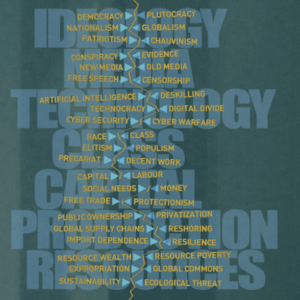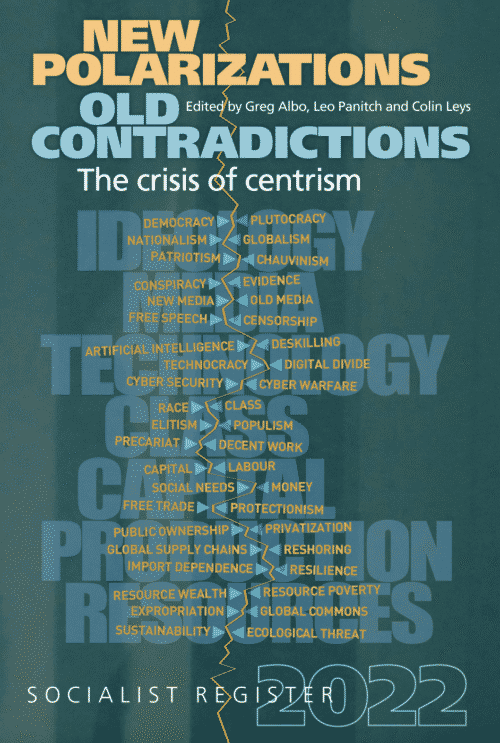Just as the Russia-Ukraine crisis first devolved, and only weeks before the elections in the Philippines, Walden Bello, Jayati Ghosh, and Vishwas Satgar came together with Greg Albo of the “Socialist Register” to discuss the South China Sea, Ukraine, NATO, American bellicosity, and the decline of the U.S. empire.
They gathered in honor of the final volume of the “Socialist Register” to have been shaped by the late Leo Panitch. Sharing perspectives from multiple geographic vantages, each made reference to their contributions to the 2022 volume, “New Polarizations, Old Contradictions: The Crisis of Centrism,” addressing epidemiological neoliberalism in South Africa, pandemic polarizations, vaccine nationalism and the growing U.S.-China divide.
From the Preface to
Socialist Register 2022:
Leo Panitch’s last volume
…The shock to us, along with all his friends, colleagues, students, and comrades around the world, was momentarily paralysing. This volume was in preparation; it was hard enough to bring it to completion on time without Leo, let alone to write anything about him that could begin to do justice to his 35 years as the Register’s editor, not to mention his place in the history of the left. Some considered appreciations have already appeared, notably the book edited by Leo’s Register colleagues Greg Albo, Steve Maher and Alan Zuege, entitled State Transformations: Classes, Strategy, Socialism (Brill 2021), in honour and memory of Leo’s contribution to a critical political science…Ursula Huws, a contributing editor of the Register over many years, also noted:
It is indeed hard to imagine anyone else on the planet with such a vast overview. He did not just have a horizon-to-horizon knowledge of the literature but was also personally acquainted with many of the greatest political thinkers of our time. He used to boast about how rarely anyone turned down an invitation to contribute to Socialist Register, attributing that to its history as a non-sectarian source of quality analysis. In fact, I suspect, it was Leo himself they did not want to say no to. The warmth and charisma that he radiated made everyone want to be included in it. And he bore no grudges, often inviting people with whom he might have had serious disagreements on some issues to contribute their ideas if he thought these ideas deserved a hearing.
All this and more is reflected in the thinking behind the present volume, which Leo planned and commissioned with Greg Albo, and which he had been corresponding about with some of the contributors until his last days. The commissioning letter he and Greg sent to contributors set out the task as follows:
With the word polarization now on the lips of commentators on the left as well as mainstream journalists everywhere, we feel it is the responsibility for the Register to undertake a deeper analysis of the current political and economic moment by addressing the underlying social contradictions that are producing these polarizations. It is one of the great ironies of our time that, just two decades after capitalism became the singular global mode of production, as capitalist accumulation and social relations finally penetrated every corner of the earth over 150 years after the Communist Manifesto predicted this, that polarizations of politics, income and wealth, gross consumption alongside abysmal poverty, of ecological destruction, are there for all to see. What Philip Roth wrote about the personality of his Mickey Sabbath character in his novel, Sabbath’s Theater, seems to apply to 21st century capitalism: “What’s clinically denoted by the word ‘bi-polarity’ is something puny … Imagine, rather, a multitudinous intensity of polarities, polarities piled shamelessly upon polarities, polarities to comprise not a company of players, but this single existence, this theatre of one.’
…A second year of the Covid-19 pandemic is adding to the polarities in its unequal impact on the global north and the global south, on the zones and classes with access to vaccines and those without, and on public health systems that have weathered decades of austerity with some remaining operational capacities and those on the brink of collapse. As well, the global lockdown to contain the virus brought about the deepest and most abrupt recession capitalism has experienced in decades, reinforcing pre-existing divisions in the world market. The emergency economic stimulus, with both fiscal and monetary policy adopting exceptional policy stances, is now approaching wartime levels, leading many pundits to suggest a ‘return of the state’ (as if it had ever disappeared). But after so many declarations in the past of the replacement of market-driven politics by a new centrist politics of Keynesian economic guidance, more than a little scepticism is warranted. Despite daily reports of unprecedented ‘weather events’ – heat domes, flash floods, raging fires, droughts, constant hurricanes – it is still market ecology and the pricing of carbon that frames the prevailing policy accord on climate change. And in this multi-dimensional crisis, the centre-right consensus that was struck around the neoliberal policy regime has been steadily splintering, with a phalanx of far right and neo-fascist groups inserting themselves into electoral politics and gaining prominence ‘in the streets’ (not least in motley demonstrations against pandemic measures of any kind, from lockdowns to masking).
The observation that capitalism is always characterized by just such economic and political polarizations has preoccupied – even haunted – socialist analysis from its very origins: in Marx’s and Engels’ memorable phrase of revolutionary optimism in The Communist Manifesto, ‘the more or less open civil war, raging within existing society, up to the point where that war breaks out into open revolution, and … lays the foundation for the sway of the proletariat’….in stating his ‘General Law’ in this absolute fashion Marx allows us to see that the very ‘inner nature’ of capital is constantly pushing toward a polarization to secure the conditions for extracting value and profits irrespective of the social consequences. That is the system, Marx is insisting, that the working-class movement is up against.
AT THE SUMMIT OF GLOBAL CAPITALISM:
ACCOMMODATION, RIVALRY, OR
CONFRONTATION BETWEEN
THE US AND CHINA?
by WELDON BELLO
The truth is that China’s capitalists live with constant apprehension of what the real bosses might do to them should they incur their displeasure, as Ma did.
China’s real boss, its ruling class, is the Chinese Communist Party (though this is far from being the dictatorship of the proletariat that Lenin envisioned as the role to be played by a Communist party in the construction of socialism). Rather than engage in theoretical debates revolving around an ideal-typical capitalist ruling class, one should begin with the concrete facts about the CCP.
First, the basic fact is that its situation is not that of a political elite responding to a national capitalist class that has led the way in creating a capitalist economy.
l capitalist class that has led the way in creating a capitalist economy. Rather, it is a political elite that has led the development of a capitalist economy in partnership with foreign capital, creating, as a by-product, a national capitalist class dependent for its survival on the elite’s power to protect and advance its interests on the global stage.
Second, this elite had a strong material presence in the productive process via its control of some 150,000 state-owned central and provincial enterprises that competed and checked the private sector domestically, some of which were in the vanguard of the economy’s global expansion.
Third, the state elite controlled instruments which were as powerful as market forces in guiding the development of the economy: the array of technocratic fiscal, monetary, and trade policy tools that it had adopted from the west but joined to a mercantilist, nation state-centred perspective. The CCP was not, in this sense, qualitatively different from the Japanese, Korean, and Taiwanese developmental states. They were all examples of bureaucratic elites that spawned their capitalist classes.
 FROM “PANDEMIC POLARIZATIONS
FROM “PANDEMIC POLARIZATIONS
AND THE CONTRADICTIONS OF INDIAN CAPITALISM”
by JAYATI GHOSH
For some time now India has been viewed by the western powers as an important ally in the fight against ‘the other’ – now perceived to be an authoritarian China. The growing neoliberal bent of successive governments in power in India has generated further enthusiasm in western capitals, especially in global financial markets. India is important both economically as a potential ‘rising power’, with its vast and predominantly young population, and in geostrategic terms as a bulwark against China. To that end, especially over the past decade, mainstream western observers ignored various flaws and inadequacies in the pattern of capitalist development in India, such as sharply increasing inequalities, the continuing poverty and insecurity of the vast majority of Indians, and poor improvement and even slippage in basic human development indicators;2 relatively high GDP rates were celebrated, irrespective of their lack of plausibility. The fascist tendencies of the ruling party and growing signs of intolerance and authoritarianism on the part of the central government were met with only mild admonishments by the self-appointed rulers of the world, such as the G7.3 This inconsistent stance would in any case have been hard to sustain over time. But the Covid-19 pandemic may turn out to be a watershed in revealing the extent to which the vision of India competing with China on even somewhat equal terms – a vision which academics have long shown to be a fantasy – will finally have to be abandoned.
 FROM “EPIDEMIOLOGICAL
FROM “EPIDEMIOLOGICAL
NEOLIBERALISM IN SOUTH AFRICA”
by VISHWAS SATGAR
The Covid-19 pandemic inaugurated a new global conjuncture of the neoliberal class project. More than four decades of constant recalibration of financialized market rationality to deal with ‘market failures’ – market reform agendas, austerity, rising authoritarianism and exclusionary nationalism – have not ended the neoliberal project. The result is a set of contradictions ramifying through the entire capitalist system, its structures, its social relations and the ecological basis of its existence – a crisis of socio-ecological reproduction in its broadest sense. This crisis has become exemplified by the Covid-19 pandemic. As Mike Davis has pointed out, the current pandemic, as with previous ones, is ‘directly the result of economic globalization’,1 which destroyed natural habitats and the natural commons; transmitted divisions between species; and deepened the divides of class, social inequalities, and nation states. More pandemics can be expected, thanks to factory farming, giant feedlots, fish farms and the ecocidal logic central to global accumulation. At the same time, the Covid-19 pandemic has demonstrated an incredible power to bring much of the world economy to a standstill. It has grounded airlines, tied up shipping, and disrupted global economic flows.
This is the pandemic’s conjunctural significance. Within a short period of time the global power structure, national ruling classes, and capital had to find new modes of rule. A global public health emergency, foregrounding the need to ensure the well-being of societies and manage crisis-ridden globalized economies, brought a different set of imperatives to the fore. Decades of privatizing and underfunding public health care, sharp social inequalities, and externally dependent economies all fell short. It is in this context that Joe Biden’s proclamation that ‘trickle-down economics has never worked’ has to be understood. While the Biden administration appears to be upending some of the key tenets of neoliberal ideology, the conjunctural shift propelled by the Covid-19 pandemic has been playing itself out differently in other parts of the world.
In South Africa the response to the pandemic took place in a context of more than two-and-a-half decades of neoliberal restructuring. Managing a crisis-ridden, globalized, and carbon-based capitalist economy, South Africa’s deeply corrupt government continued to use a financialized market rationality as the basis for its response, including policies to mitigate the socio-economic impacts and challenges the pandemic presented. The ruling class is completely disconnected from the suffering in society, displaying a strong appetite for criminalized accumulation, while the crisis of legitimacy of the ruling African National Congress (ANC) and its allies intensifies. A failing class project has been rammed down the throat of a fear-ridden and vulnerable society.
FROM “FICTITIOUS POLARIZATIONS:
THE FAR RIGHT, CORPORATE POWER
AND SOCIAL STRUGGLES IN BRAZIL”
By ANA GARCIA, VIRGINIA FONTES and REJANE HOEVELER
Studies of social polarization tend to refer to a set of political party forces and affirm an interpretation of politics that limits it to formal parliamentary electoral processes and institutions. While not ignoring social struggles, these analyses rarely account for the fact that a growing share of social and class struggles takes place outside the realm of electoral politics and government institutions, and that the actors involved maintain unequal relationships with the state. We call ‘fictitious polarization’ the false form of political contrast represented by electoral political parties portrayed as opposite poles, centred on disputes over cultural issues, which leave economic struggles to the side. Such a focus overshadows and mis-identifies the real polarization: that of social classes, whose struggles today encompass the economic and political spheres but also social and cultural realms….
FROM “WHAT IS WRONG
WITH SOCIAL MEDIA?
AN ANTI-CAPITALIST CRITIQUE”
by MARCUS GILROY-WARE
As the liberal fantasy of a stable ‘capitalist democracy’ has steadily disintegrated in the last few years, the digital giants – Google, Apple, Twitter, and in particular, Facebook Inc. – have provided some of the most conspicuous evidence of the increasingly bitter and polarized nature of political discourse, having been amongst the main arenas in which many of these discursive conflicts have been played out.
This staging has led many people to draw an association between social media and the broader political moment, and often to suggest that there might be causation between the two. There are good reasons to talk about social media together with polarization and other social and political problems. There are also many urgent criticisms of digital platforms that are much deserved, both in connection with these political circumstances and in broader political-economic terms. Unfortunately, however, many of the most frequently cited critiques of social media giants are not only inaccurate, but harmful, because of the ways in which they obscure our understanding of the threats that social media do represent, and the other more immediate causes of this political turbulence…
With further contributions from:
Walden Bello, Bill Fletcher Jr., Samir Gandesha, Sam Gindin, David Harvey, Ilya Matveev, Simon Mohun, Adolph Reed Jr. and Touré F. Reed, James Schneider, Ingar Solty, Samir Sonti, Hilary Wainwright, and Oleg Zhuravlev.
To read the rest, get your copy here
Or click on the book cover below
Greg Albo is a Professor in the Department of Political Science at York University, Toronto, as was the late Leo Panitch. Colin Leys is Emeritus Professor of Political Studies at Queen’s University in Kingston, Ontario.

 FROM “PANDEMIC POLARIZATIONS
FROM “PANDEMIC POLARIZATIONS FROM “EPIDEMIOLOGICAL
FROM “EPIDEMIOLOGICAL
Comments are closed.